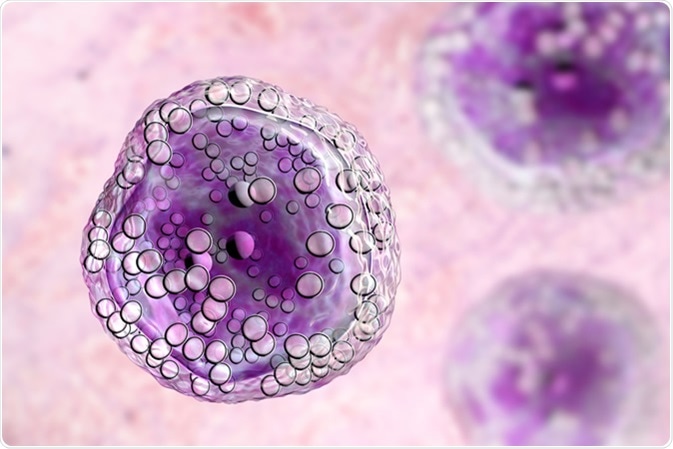Acquired immunodeficiency syndrome (AIDS) is a state of severe immunosuppression in which patients are at increased risk for lymphoma.
HIV and AIDS
Human immunodeficiency virus (HIV) infection attackes the immune system of infected persons. It can be spread through unprotected sex, shared needles and other drug paraphernalia, and from mother to child during pregnancy, breastfeeding, or delivery.
An HIV infection initially has a prolonged period of no symptoms or a short period of flu-like symptoms which are followed by a prolonged period of no symptoms. As the infection progresses, the levels of CD4 cells drop and patients become more susceptible to opportunistic pathogens. AIDS is the eventual consequence of HIV infection that is characterized by a severely weakened immune system that renders the body more susceptible to various infections and cancers.
AIDS-related lymphoma
AIDS does not directly cause lymphoma, but rather causes immunosuppression that prevents the body from mounting ordinary defenses that prevent tumor development.
Although the incidence of non-Hodgkin’s lymphoma, primary cerebral lymphoma, and Hodgkin’s lymphomas are all increased in patients with AIDS, the primary AIDS-related lymphomas are diffuse large B-cell lymphoma (DLBCL) and Burkitt lymphoma (BL).

Burkitt's lymphoma cells, is a cancer of the lymphatic system, a monoclonal B-cell tumor, 3D illustration. Image Credit: Kateryna Kon / Shutterstock
NHL refers to any lymphoma that is not Hodgkin’s lymphoma. Symptoms of NHL include enlarged lymph nodes, fevers, weight loss, and tiredness. Hodgkin’s lymphomas produce similar symptoms to non-Hodgkin's lymphomas; however, different lymphocytes are involved in the disease progression. Primary cerebral lymphoma is a form of NHL that mainly occurs in immunocompromised patients. It is characterized by the formation of a primary intracranial tumor. Symptoms include headaches, vertigo, monocular vision loss, and seizures.
DLBCL is the most common AIDS-related lymphoma type, it is mainly expressed at an advanced stage of AIDS in severely immunosuppressed patients. It is characterized by overexpression of c-myc and bc-2 pro-oncogenes. Survival of DLBCL is dependent on the immune system strength, as evidenced by the association between low CD4 T cell count and poor survival.
BL is the second most common AIDS-related lymphoma. It occurs in patients with relatively moderate CD4 T cell counts. It can be characterized by a low WHO performance status (characterizes the general well-being of cancer patients) and a high lactose dehydrogenase level.
Treatment of AIDS-related lymphoma
After diagnosing an individual with AIDS-related lymphoma, other parameters have to be evaluated. These include the evaluation of lymphoid malignancy, assessment of HIV status, CD4+ cell counts, HIV viral load, the susceptibility of the virus to available drugs, and history of a history of any AIDS-related problems. This will allow medical professionals to create a treatment option suitable for the patient and assess how the patient will respond to the treatment.
With AIDS-related lymphomas, both the lymphoma and the HIV infection must be treated simultaneously. Unfortunately, many HIV medications and chemotherapy agents have similar side effects, such as renal toxicity, hepatic toxicity, and peripheral neuropathy. Additionally, some chemotherapy and HIV medications are metabolized through the p450 (CYP) enzyme system of the liver. These factors increase the difficulty of providing effective treatments for AIDS-related lymphomas.
The treatment for HIV-associated DLBCL varies in effectiveness with approximately 30-74% chance of complete remission depending on the treatment used and the severity of the lymphoma. HIV-associated BL treatment has much more effective treatments with approximately 63-100% chance of complete remission.
In the past few decades, research and development on stem cell transplants for the treatment of AIDS-related lymphomas has increased their efficiency. This is mainly due to the introduction of combination antiretroviral therapy (cART). Unfortunately, chronic graft versus host disease (GVHD) develops in up to 40% of patients receiving allograft stem cell transplants. The overall survival rate for allograft stem cell transplants is approximately 57% with the major causes of death being disease relapse, acute or chronic GVHD, or liver failure.
HIV-Associated Lymphoma: Treatment Patterns and Survival in the Antiretroviral Era
Further Reading
Last Updated: May 21, 2019